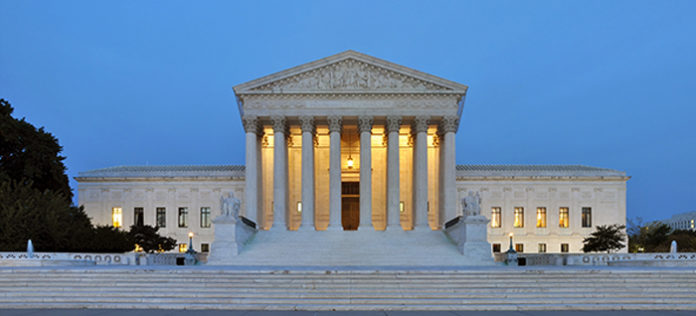

The securities world’s collective eyes were on the Supreme Court and whether it would find the Securities and Exchange Commission’s administrative law judge system to be constitutional. But even after the court dealt the SEC’s ALJ proceedings a blow in a landmark decision last month, securities law practitioners are yet unsure what the fallout will look like.
In Raymond Lucia, et al v. SEC, the Supreme Court held that SEC ALJs are “officers of the United States,” meaning that they can only be appointed by the President, the courts or “heads of departments” under the Constitution’s Appointments Clause. The Supreme Court ruled 7-2 that Lucia’s case was heard by an ALJ who wasn’t constitutionally appointed and that the respondent was therefore entitled to a new hearing before a different ALJ. But the June 21 Lucia decision raises questions as to what will happen to the other cases heard by SEC ALJs, and even ALJs in other federal agencies.
The SEC currently has five ALJs, including Chief Administrative Law Judge Brenda Murray, who decide the commission’s enforcement actions, issuing sanctions, ordering disgorgements and even barring individuals from the securities industry. The commission saw numerous challenges to ALJ decisions on the grounds that the judges should have been appointed in accordance with the Constitution’s Appointments clause, but were instead hired as employees by the SEC. A panel majority at the 10th Circuit Court of Appeals sided against the government on this issue in its December 2016 decision, Bandimere v. SEC. The Supreme Court granted cert to Lucia v. SEC, which came out of the D.C. Circuit, to resolve the issue.
The SEC has argued that the ALJs weren’t officers but rather employees that were appropriately placed in their positions through the commission’s own hiring process. But the Supreme Court relied on its own precedent in Freytag v. Commissioner, where it found the U.S. Tax Court’s “special trial judges” to be officers and not employees.
To mitigate the potential damage of a loss in Lucia, the SEC in November ratified the appointments of its ALJs in an effort that it said “resolved any concerns” that the proceedings they presided over violated the Constitution. The court’s Lucia decision, however, didn’t address whether those ratifications removed all doubt as to the ALJs’ constitutionality going forward.
One of the biggest questions in the Lucia aftermath is what the SEC will do with scores of prior cases that were decided by judges who were unconstitutionally appointed. Effective June 22, the SEC issued a 30-day stay on its in-house cases while it figures out how to procedurally respond to the court’s ruling.
“The SEC has clearly, by issuing a stay, sent a signal … that they don’t have a course of action yet,” said David Zisser, a partner at Jones & Keller. Zisser argued Bandimere v. SEC at the 10th Circuit, which “set aside” the Bandimere action but didn’t remand it. Zisser said he hasn’t yet received any notice that the commission intends to retry Bandimere. But having another go at all of the cases that were tainted by unconstitutional ALJs would only add to the SEC’s current caseload.
“Even assuming that they can retry everybody that they want … there’s still a big resource issue for them,” Zisser said. The commission still has only five ALJs to hear cases and a limited number of SEC trial attorneys to try them.
Thomas Krysa, a securities litigator and shareholder at Brownstein Hyatt Farber Shreck, said the resources issue will put the commission in a difficult position in terms of how to handle the pending cases. “The commission is going to have to decide which cases to retry and which ones to let go,” he said.
The resource strain on the SEC trial lawyers could lead the commission to drop certain cases. “That seems tough” for the commission to do, “but they may have to,” Krysa added. There’s even a chance that a rehearing backlog could stymie the SEC’s enforcement activity, such that it has to divert resources from trying new matters to retrying previous ones, he said.
It’s not entirely clear which SEC administrative proceedings Lucia left open for rehearing — whether it was any that were ever decided by the unconstitutionally appointed judges, or if it’s limited to only those that haven’t received a final ruling yet.
Tamara Seelman, who co-chairs the securities litigation practice group at Gordon Rees Scully Mansukhani in Denver, said the Lucia decision is a narrow one that doesn’t constitute “that big of a shakeup” for the SEC. Respondents might only be affected if they raised an objection to the ALJ’s decision, and the remedy there is those respondents will get a hearing like Lucia will, Seelman said.
“I think the shakeup is more going to be how this decision will affect ALJs in other agencies,” Seelman said. Those agencies include the Social Security Administration and the Consumer Financial Protection Bureau. But while those agencies have ALJs appointed in a similar manner as the SEC, the proceedings themselves are different enough that it’s debatable how applicable Lucia would be in challenging those ALJs, she added.
The scope of Lucia’s impact on SEC proceedings is unclear, at least until the commission issues its first orders after the 30-day stay.
“Right now there are a lot of unanswered questions, and the ball is clearly in the SEC’s court,” Zisser said. Although he’s been “closer than most” to the SEC ALJ issue, he said anyone’s guess is as good as his as to how exactly the commission will approach the tainted cases.
— Doug Chartier

